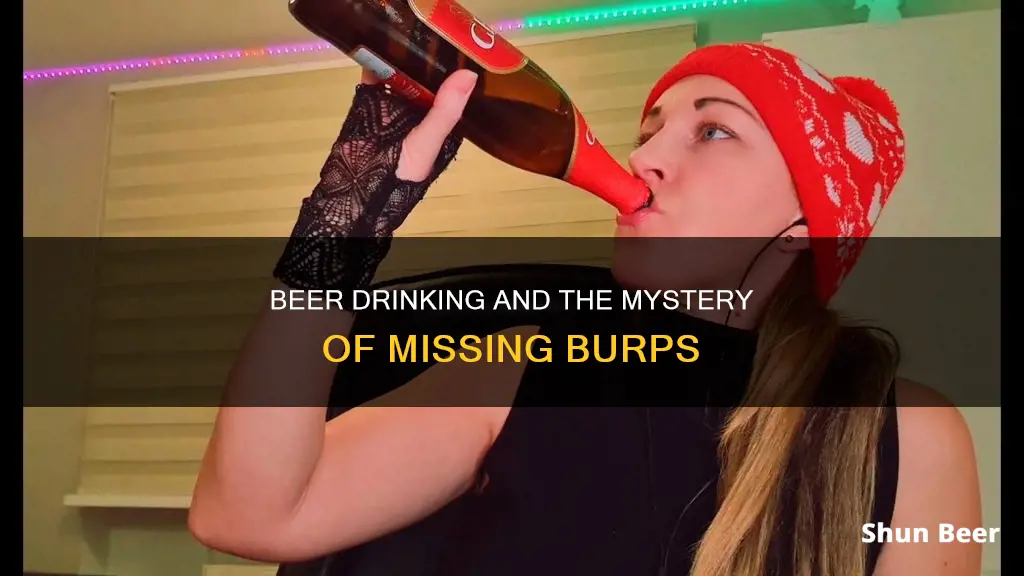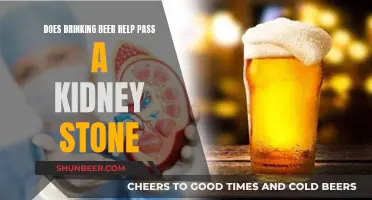
Many people experience discomfort after drinking beer due to an inability to burp. This condition, known as no-burp syndrome or retrograde cricopharyngeal dysfunction (R-CPD), affects the cricopharyngeus muscle in the upper oesophagus, preventing the release of built-up gas. While beer and other carbonated beverages can trigger this discomfort, individuals with R-CPD may also experience symptoms such as gurgling throat noises, chest pain, excessive bloating, and flatulence. Treatment options include Botox injections to relax the muscle and allow for belching, though some individuals have found temporary relief through specific drinking and movement techniques.
| Characteristics | Values |
|---|---|
| Condition Name | No-burp syndrome, Retrograde Cricopharyngeal Dysfunction (R-CPD) or Eructile Dysfunction |
| Affected Demographic | Mostly 20-30 year olds, more males than females |
| Symptoms | Inability to burp, gurgling sounds in the throat, pressure in the upper neck and lower chest, chest pain, stomach discomfort, excessive bloating, excessive flatulence, difficulty vomiting |
| Causes | Problem with the relaxation reflex of the cricopharyngeus muscle in response to oesophageal pressure |
| Diagnosis | Performed by an ENT surgeon with expertise in the condition, may involve visualising the throat with a small flexible camera |
| Treatment | Botox injections into the cricopharyngeus muscle to help it relax, surgery to divide the muscle with a laser |
| Relief Methods | Drinking carbonated beverages, moving around, eating gas-causing foods, swallowing air, triggering the gag reflex |
What You'll Learn
- Sufferers of no-burp syndrome experience social anxiety and pain
- Carbonated drinks cause gas build-up in the stomach, triggering burps
- Movement can help force air out of the stomach
- Retrograde cricopharyngeal dysfunction (R-CPD) is a condition that makes it hard to burp
- Some people induce burping by sticking a finger down their throat

Sufferers of no-burp syndrome experience social anxiety and pain
Sufferers of no-burp syndrome, or retrograde cricopharyngeus dysfunction (R-CPD), experience a range of physical symptoms that can lead to social anxiety and pain. R-CPD is a rare condition in which the cricopharyngeus muscle, located at the top of the oesophagus, fails to relax and allow air to exit the stomach and oesophagus. As a result, people with R-CPD are unable to burp or belch.
The inability to release air can cause a variety of uncomfortable symptoms, including a "bubble" of air in the mid to low neck, gurgling sounds in the neck and chest, abdominal bloating, and excessive flatulence. These symptoms can be embarrassing and socially disruptive, leading to social anxiety and even avoidance of social gatherings. Sufferers may feel miserable and experience chest pressure, abdominal pain, and discomfort.
The condition can be particularly challenging when consuming carbonated beverages like beer, as the gas in these drinks delivers additional air into the stomach. This can exacerbate the symptoms of R-CPD, leading to increased bloating, discomfort, and social anxiety.
Prior to the discovery of R-CPD in 2019, sufferers were often misdiagnosed with conditions such as acid reflux, irritable bowel syndrome, or small intestinal bacterial overgrowth. As a result, they often did not receive effective treatment for their symptoms. However, with the growing awareness of R-CPD, treatment options such as Botox injections are now available to provide relief for sufferers.
Beer Station on Carnival Fantasy: How Does It Work?
You may want to see also

Carbonated drinks cause gas build-up in the stomach, triggering burps
Carbonated drinks like beer, soda, and sparkling water are bubbly and gassy. When consumed, these drinks cause a gas buildup in the stomach, which triggers a burp and relieves abdominal pain. The amount of gas swallowed while drinking carbonated beverages directly correlates to the amount of gas buildup in the stomach. Therefore, drinking a large amount of a carbonated beverage quickly increases the chance of a burp.
When we swallow food or drink, the cricopharyngeus muscle in the throat relaxes briefly, allowing food and drink to pass into the esophagus. The rest of the time, this muscle remains contracted. In people with retrograde cricopharyngeal dysfunction (R-CPD) or "no-burp syndrome," the cricopharyngeus muscle never relaxes to let air out, leading to a buildup of gas in the stomach.
People with R-CPD experience symptoms such as a pressure sensation in the upper neck and lower chest, loud gurgling sounds, chest pain, abdominal discomfort, excessive bloating, and flatulence. Ingesting carbonated drinks like beer can worsen these symptoms.
To relieve the gas buildup caused by carbonated drinks, individuals can try drinking water from the opposite side of the glass. This involves bending over, placing your lips on the side of the glass, and slowly tilting the glass to allow water to enter your mouth. After taking small sips, stand up straight. Another method is to drink a full glass of water while holding your breath and pinching your nose to prevent releasing excess air.
Other ways to relieve gas buildup include moving around, doing light exercises, and lying on your stomach with your knees curled into your chest and arms stretched forward.
Wisconsin's Drinking Laws: Beer and Underage Drinking
You may want to see also

Movement can help force air out of the stomach
If you're struggling to burp after drinking beer, movement can help force air out of your stomach.
If you're sitting, try standing up. If you're already standing, take a seat. Alternatively, lie down and then quickly stand up. Walking, jogging, jumping up and down, or stretching may also help to push air out of your stomach.
Yoga can be a great way to relieve trapped gas. Certain poses can help relieve gas by moving your core. Twisting and bending your midsection with yoga poses can encourage gas to pass through your digestive tract. These moves can also lower stress levels, making it easier to relax and pass gas.
Try the child's pose or a spinal twist to help relieve trapped gas and bloating. Start by lying on your back with your legs extended in front of you and your arms alongside your body. As you exhale, hug your knees into your chest and clasp your hands. Tuck your chin slightly to lengthen your neck and keep your head, back, and sacrum flat on the ground. If it feels comfortable, gently rock your body back and forth or from side to side.
Squats are another great way to relieve trapped gas. Stand with your feet hip-width apart and place your hands on your hips or hold onto the back of a sturdy chair. Slowly bend your knees until your rear is close to the floor. Stay in this position until you feel the gas start to move.
Beer and Cometriq: What You Need to Know
You may want to see also

Retrograde cricopharyngeal dysfunction (R-CPD) is a condition that makes it hard to burp
Retrograde cricopharyngeal dysfunction (R-CPD), also known as "no-burp syndrome", is a rare condition that makes it difficult for people to burp or belch. It was first described in 1987, but it wasn't until 2019 that a successful treatment was established. R-CPD is characterised by four primary symptoms:
- The inability to belch
- Abdominal bloating
- Gurgling noises from the neck and chest
- Excessive flatulence
R-CPD is caused by a dysfunction of the cricopharyngeus muscle, which sits at the top of the oesophagus. This muscle normally relaxes briefly during swallowing, allowing food and liquid to pass into the oesophagus. It then tightens again, closing off the top of the oesophagus. In people with R-CPD, this muscle does not relax properly, leading to a buildup of air in the stomach, oesophagus, and intestines. This can cause bloating, pressure, and gurgling sounds in the neck, chest, and abdomen.
The underlying cause of R-CPD is unknown, but it appears to be related to the relaxation reflex of the cricopharyngeus muscle. The condition primarily affects individuals aged 20 to 30 and is more common in males, although it occurs in both genders. Many patients have experienced symptoms since childhood but have not received a proper diagnosis.
The standard treatment for R-CPD is a botulinum toxin (Botox) injection into the cricopharyngeus muscle. This injection relaxes the muscle, allowing air to escape and relieving symptoms. In some cases, a partial cricopharyngeal myotomy, a minimally invasive surgical procedure, may be recommended if symptoms do not improve with Botox injections.
Beer and Diabetes: What Diabetics Need to Know
You may want to see also

Some people induce burping by sticking a finger down their throat
Some people who experience difficulty burping after drinking beer may resort to inducing burping by sticking a finger down their throat. While this method can be effective, it is important to do it gently and with caution. The goal is to trigger the gag reflex lightly, just enough to release the air upward and induce a burp. Applying too much force can cause vomiting, so it is crucial to be gentle.
This technique is often considered a last resort, as it can be unpleasant and may lead to vomiting if not done carefully. However, for those who struggle with the inability to burp, also known as no-burp syndrome or retrograde cricopharyngeus dysfunction (R-CPD), it can provide much-needed relief from abdominal discomfort and bloating.
No-burp syndrome is a condition where the cricopharyngeus muscle, located at the top of the esophagus, never relaxes to allow air to escape through burping. This can result in a buildup of gas in the stomach, causing discomfort and gurgling sounds in the throat. While Botox injections are a common treatment for this syndrome, some individuals may opt for self-induced burping methods as a temporary solution.
It is worth noting that there are other methods to induce burping besides sticking a finger down the throat. These include drinking carbonated beverages, changing positions, swallowing air, and consuming gas-promoting foods or antacids. However, for those who have tried various methods without success, triggering the gag reflex by touching the soft palate at the back of the mouth with a clean finger can be an effective, albeit slightly unpleasant, way to find relief.
Beer and Pantoprazole: Safe Mix or Health Risk?
You may want to see also
Frequently asked questions
You may have retrograde cricopharyngeal dysfunction (R-CPD), or "no-burp syndrome". This condition is caused by a problem with the cricopharyngeus muscle in the upper oesophagus, which is unable to relax and allow gas to escape.
Typical symptoms include the inability to burp or belch, a pressure sensation in the upper neck and lower chest, loud gurgling sounds, chest pain, stomach discomfort, excessive bloating, and flatulence.
R-CPD can be treated with Botox injections into the cricopharyngeus muscle to help it relax and allow patients to belch.
Yes, you can try drinking carbonated beverages, eating gas-causing foods, exercising, and changing your breathing patterns to help move air out of your body.







